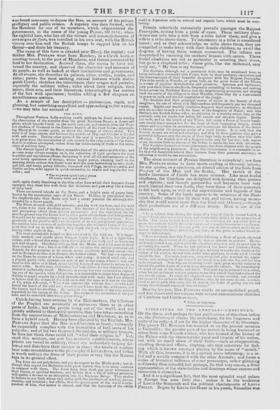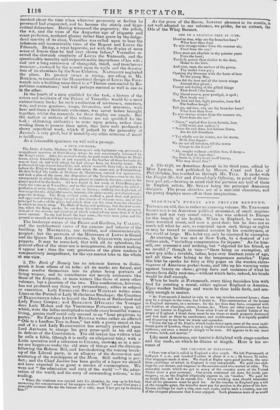LITERATURE OF THE ANNUALS—CONTINUED.
OF the three, and perhaps the last publications of this class before us, the Pie! uresve claims the precedence, for the largeness and unity of its subject, if not for the higher character of its literature. The quarry Mr. &teeing has resorted to on the present occasion is Versailles ; the greater part of his materi ils being borrowed or taken from some French author, who has treated of the history of the Palace with the characteristic point and vivacity of his nation, but with no small share of their faults—such as exaggeration, startling theatrical effects, claptrap, and that substitute for feel- ing which is known amongst players by the name of "mouth."' With all this, however, it is in a certain sense informing; is a re- lief and a novelty compared with the other Annuals; and forms a series of historical tableaux of court personages, rather glittering and tawdry than splendid, but perhaps, for that very reason, a fitter representation of the state-hackies and demireps whose careers and characters it chronicles.
And it is a significant fact, that the most splendid regal palace in Europe has seen little else ; unless it be the weakness of Louts the Sixteenth and the political charlatanerie of LOUIS PHILIP. Begun by Louts the Great in his youth, Versailles was finished about the time when whatever generosity or feeling be possessed had evaporated, and be became the stately and hypo- critical debauchee. Having witnessed the pageantry, the polish, the wit, and the vices of the Augustan age of etiquette and court profusion, rendered gloomy rather than grave by the dodge- devil sanctity of its close, Versailles was called upon to bear the infamous and inconceivable vices of the Regent and Louis the Fifteenth. Dying, a royal hypocrite, yet with the display of more sense of fitness than he had ever shown before,* Versailles re• ceived the clownish simplicity of Louis the Sixteenth, and the questionable morality and unquestionable imprudence of his wife ; and saw a long succession of changeful, timid, and treacherous measures, crowned by the assault upon its walls and the desecra- tion of its chambers by the Sans Culottes. NAPOLEON neglected the place. Its present owner is trying, acc,,rding to Mr. ityrentE, to transform the Munarchical design of Louis the Four- teenth into a building more fitted to a "Throne surrounded by Re- publican institutions ;" and will perhaps succeed as well in one as in the other.
In the hands of a man qualified for the task, a history of the actors and incidents of the Palace of Versailles would be a most extraordinary book ; for such a collection of mistresses, courtiers, wits, and even geniuses, kings, favourites, and ministers, with Isere and there a third-rate statesman, was never before brought together, whilst the materials for their display are ample. But the author or authors of this volume are not qualified for the task : skimming authorities to seize upon points, rather than reading them to possess their spirit, they have only produced a showy superficial work, which if judged by the generality of Annuals is very goad, but if tested by any other criterion of merit is indifferent.
As a favourable specimen we will cull a passage.
A TRUE COURTIER.
The Duke d'Antin, Madame de 3Iontespan's only legitimate son, possessed a magnificent mansion at Petit.Bourg. where he was occasionally honoured by the King's visits. After his mother's death, he paid court to Madame de :Maim tenon, whose friendship he at last secured, as the brother of those bastards she was so fond of, and with whom he had always been on friendly terms. He performed things almost incredible, and which resemble flirt' tales, in order to induce the King to sleep under his roof, when the court was at Fontainbleau. He first bribed the valets of Madame de Maintenon, entered her apartments, and took u plan of the room, the disposition of the furniture—even to the dis- arrangement in which the things were placed or carelessly thrown—even to the places masked in the books. All was tilund in her room at Petit-llourg, pre- cisely the aline as at ‘'ersailles ; and to this refinement of gallanti y he added a profusion of every thing, whether of use or luxury ; nothing was neglected, all was magnificent; delightful music, interminable amusements, and elegant equi- pages fur driving. The King arrived early, walked a good deal, and praised and appraved of every thing, except a fine avenue of ellesnut •trees, one of the principal lariuti,s of the place, but which shot ont the view from the chamber in which Ile was to sleep. The Duke d'Antin Said nothing ; but the next morn. ing, when the King awoke, he saw from his window a must lovely prospect, instead of the avenue, not a vestige of which remained any more than if it had never existed. No one had heard the least noise; the trees were gone, and the ground as smooth as if it had never been broken.
The landscape scenes of the Palace and Gardens, by CALLOW, and the architectural views of the exterior and interior of the building, by MACKENZIE, are faithful, and characteristically peopled ; but the portraits of the Mistresses of Louts le Grand and the Queen MARIE ANTOINETTE, by COLLIGNON, represent puppets. It may be remarked, that with all its splendour, the general effect of the structure is unimpressive, its extent making it appear low : thus the very greatness of the place renders it comparatively insignificant, for the eye cannot take in the whole at one view.
2. The Book of Beauty has no intrinsic feature to distin- guish it from others of its tribe: all its marks are formal, and these resolve themselves into its plates being portraits of living women, and its contributors not merely aristocrats like those of the Keepsake, or mere writers like those of many other volumes, but a junction of the two. This combination, however, has not produced any thing very extraordinary, either in subject or execution. Lady EMMELINE STUART WORTLEY writes some Lines on the Portrait of Lady Wilhelmina Stanhope; the Countess of BLESSINGTON takes to herself the Dutchess of Sutherland and Lady Fanny Cowper ; and BENJAMIN DISRAELI the Younger does Lady Mahon and the Viscountess Powerscourt ; upon all which, were the ladies multiplied to include every beautiful woman living, genius itself could only succeed in an "hour propitious to poetry." Sir EDWARD LYTTON BULWER writes rather an affected "Ode to a Leafless Tree in June," but with a pretty moral at the end of it ; and Lady BLESSINGTON has actually prevailed upon Lord ABINGER to charge his gray goose-quill in his old age in defence of the Constitution. The old lawyer has written what be calls a fable, (though it is really an allegorical tale,) with a Latin quotation and a reference to CICERO, showing as in a mir- ror our happiness under the old state of things and the divisions following the Reform Bill, and foreshadowing the coming break- up of the Liberal party, in an allegory of the destruction and scattering of the worshippers of the Moon. Still nothing is per- fect; and the Chief Justice has been guilty of a lapse we should not have expected in so great a master of commonplace. We were not " the admiration and envy of the world"—" the admi- ration of the world, and the envy of surrounding nations," is the reading.
• When the viaticum was carried into his chamber, be rose up in his bed, answering the remonstrances of his surgeon with—" What ! when God pays a miserable creature like me the honour of a visit, must I not get up to receive him ?"
As the prose of the Baron, however pleasant in its results, is not well adapted to our columns, we prefer, for an extract, the Ode of the Whig Baronet.
ODE TO A LEAFLESS TREE IN JtiNNE,
Desolate tree, why are thy branches bare? What hest thou done To win strange winter from the summer air, Frost from the sun?
Thou wert not churlish in thy palmier years Unto the herd ; Tenderly gayest thou shelter to the deer, Home to the bird.
And ever, once, the earliest of the grove, Thy smiles were gay Opening thy blossoms with the haste of love To the young May.
Then did the bees and all the insect wings Around thee gleam ; Feaster and darling of the gilded things That dwell i'the beam.
Thy liberal course, poor prodigal, is sped ; How lonely now ! Huw bird and bee, light parasites, have fled The leafless bough !
Tell ow, sad tree, why are thy branches bare? What bast thou done To win strange winter from the summer air, Frost from the sun?
"Never," replied that forest-hermit, lone, (Old truth and endless!) "Never fur evil done, but fortune flown, Are we left friendless.
" Yet wholly nor for winter, nor for storm, Doth love depart : We are not all forsaken, till the worm
Creeps to the heart !
"Al,, nought without—within thee, if decay—
Can heal or hurt thee!
Nor boots it, if thy heart itself betray, Who may desert thee!"
3. The Gift, an American Annual in its third year, edited by Miss LESLIE, and published by Messrs. CARY and LEA of Philadelphia, has reached us through Mr. TILT. It ranks with the Forget-Me-Not and Friendship's Ofiering, in point of litera- ture and art,—bearing in mind that the pictures are half of them by English artists, Mr. SULLY being the principal American designer. The prose sketches are of a material character, and the poetry displays more effort than imagination.



























 Previous page
Previous page